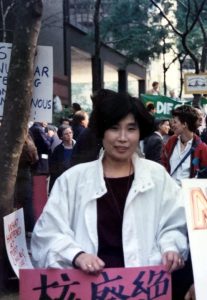My Life—Interview with Keiko Ogura, interpreter and A-bomb survivor, Part 10: Global hibakusha
May 11, 2023
by Hiromi Morita, Staff Writer
In the fall of 1987, Ms. Ogura participated in the First Global Radiation Victims Conference, held in New York City, over a period of eight days as a member of a delegation made up of the Hiroshima prefectural chapter of the Japan Congress Against A- and H-Bombs (Gensuikin) and other organizations.
Victims of radiation exposure, specialists in the field, and peace activists from around the world gathered for the conference. At the symposium and section meetings, I heard stories from people who worked in uranium mines in the United States, residents who lived in the vicinity of nuclear test sites, as well as engineers and former soldiers who had been involved in nuclear testing. I also paid a visit to Three Mile Island, the site of the nuclear accident that happened in 1979, spoke with residents who were suffering from what appeared to be radiation-included cancers, and had a chance to take a look at deformed plants.
I also encountered people who justified the atomic bombings. When I shared my A-bomb experience at a gathering of Americans while I was in New York, someone told me, "Congratulations. I mean, you were able to make it here thanks to the atomic bombings. All Japanese would have committed suicide had the atomic bombs not been dropped.” When I objected, that person replied, “You learned in elementary school that the atomic bombings saved lots of lives, right?” When I argued back, “In Hiroshima, we teach about both the damage and the suffering,” the person became furious. I would later have numerous terrible experiences of a similar nature.
After the conference ended, I flew alone to Boston and Wyoming to see friends I had made in Hiroshima. I then joined an old journalist friend and went to a Native American reservation in the state of Arizona, where the first uranium was mined in the United States. We drove through a town in New Mexico where mines and refineries were concentrated, and then traveled to Utah to listen to the stories of residents of a town located to the leeward side of the Nevada Test Site. In San Francisco, we heard reports from military veterans who were exposed to radiation and demanding compensation from the government. All those stories confirmed what I had heard at the conference.
I learned that so many people, especially vulnerable ones, have become victims of the cycle of development, testing, and use of nuclear weapons that begins with uranium mining. By meeting with ‘global hibakusha’ (nuclear victims around the world), I came to full appreciate that the nuclear issue is ongoing. People of the A-bombed cities need to communicate the message of those victims as well, based on the act of listening to their stories. I felt that the month-long experience I had at the time paved the way for my understanding of my own role in the future.
(Originally published on May 11, 2023)
In the fall of 1987, Ms. Ogura participated in the First Global Radiation Victims Conference, held in New York City, over a period of eight days as a member of a delegation made up of the Hiroshima prefectural chapter of the Japan Congress Against A- and H-Bombs (Gensuikin) and other organizations.
Victims of radiation exposure, specialists in the field, and peace activists from around the world gathered for the conference. At the symposium and section meetings, I heard stories from people who worked in uranium mines in the United States, residents who lived in the vicinity of nuclear test sites, as well as engineers and former soldiers who had been involved in nuclear testing. I also paid a visit to Three Mile Island, the site of the nuclear accident that happened in 1979, spoke with residents who were suffering from what appeared to be radiation-included cancers, and had a chance to take a look at deformed plants.
I also encountered people who justified the atomic bombings. When I shared my A-bomb experience at a gathering of Americans while I was in New York, someone told me, "Congratulations. I mean, you were able to make it here thanks to the atomic bombings. All Japanese would have committed suicide had the atomic bombs not been dropped.” When I objected, that person replied, “You learned in elementary school that the atomic bombings saved lots of lives, right?” When I argued back, “In Hiroshima, we teach about both the damage and the suffering,” the person became furious. I would later have numerous terrible experiences of a similar nature.
After the conference ended, I flew alone to Boston and Wyoming to see friends I had made in Hiroshima. I then joined an old journalist friend and went to a Native American reservation in the state of Arizona, where the first uranium was mined in the United States. We drove through a town in New Mexico where mines and refineries were concentrated, and then traveled to Utah to listen to the stories of residents of a town located to the leeward side of the Nevada Test Site. In San Francisco, we heard reports from military veterans who were exposed to radiation and demanding compensation from the government. All those stories confirmed what I had heard at the conference.
I learned that so many people, especially vulnerable ones, have become victims of the cycle of development, testing, and use of nuclear weapons that begins with uranium mining. By meeting with ‘global hibakusha’ (nuclear victims around the world), I came to full appreciate that the nuclear issue is ongoing. People of the A-bombed cities need to communicate the message of those victims as well, based on the act of listening to their stories. I felt that the month-long experience I had at the time paved the way for my understanding of my own role in the future.
(Originally published on May 11, 2023)








